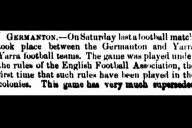France 0 Germany 1
Because I somehow got roped into watching two episodes of the 1997 adventure series Conan the Adventurer – think Hercules or Xena, but with about 1/10th of the budget, awful plots and the guy who played Mickey on Seinfeld as comic relief – I leave it a bit late to go to bed, and make it worse by turning on the radio just quickly to get the footy scores. North are leading by about four goals early in the last quarter, and the ABC commentary team reckon Lindsay Thomas’ attempt to get a free kick was straight out of the World Cup. I can be indignant or I can take their word for it, so I choose the former, with the option of not making a big deal out of it. Perhaps due to the aforementioned dithering, I’m late to the next day’s game, getting on the couch just in time to see the replay of Germany’s – and the game’s – only goal. It’s like arriving late to a party, and missing out on the one joke that carries the night; but if it is a party, it’s a pretty sober one, eleven vs eleven duelling chess players who know each others’ game inside out, so the margins for error are minute, and consequently significant errors are rare. This is football as scientific theory, doing what works until proven wrong. It is football as rigorously studied deadlock, a nearly zero sum game almost obligated to end up in stalemate, were it not for the cosmic order which says there must be a result today. There is no magic here, no faith, no mystery and no mystique – it’s athleticism as conceived rationally. It’s a game for the chinstrokers, a contest which seems to have offended the sensibilities of many people on Twitter, but don’t the chinstrokers need games to enjoy, too? Must it always be the all or nothing ideology of soccer as reckless abandon or else death to football? That the goal comes from a set piece is perhaps no accident, the ball sent in from out wide and perhaps willing itself into the back of the French net. Maybe because I have a reputation for being contrary – which some have interpreted as being wilfully difficult – I find myself strangely attracted to this game. If I knew about art, I would say this game was mannerist, but I don’t know about art. There is art here, of a sort, but it’s close to no art as the players – who are efficient, well programmed, and certainly not lacking in skill – negate each other, and produce almost no meaning, If that near total negation of outcome sounds like post-modern football personified, then so be it, but not every game turns out this way, and the players who played this game may one day meet again and produce a different kind of theatre. Or perhaps in Hugh Everett III’s many and infinite universes they’re playing every possible variation of this fixture, and while we can pine for any one of those games which may happen to be more interesting, all we have access to in this universe is the game that occurred in our part of this timeline.
Brazil 2 Colombia 1
I doze on the couch for an hour, as NHK’s English news from Tokyo plays in the background. There are missing Japanese nationals in North Korea, and the North Koreans have apparently assembled a high powered committee to look into the matter. Meanwhile, at the Fukushima nuclear power plant they’re going to try and install a massive wall of ice to apparently slow the build up of radioactive water. Colombia are sitting too deep, they’ve sunk themselves before the game has begun. They’re in so deep they can’t get out. From an early Brazil corner Colombian concentration lapses and chaos ensues. During the half time break natter, Ned Zelic will blame man on man marking compared to zonal marking for Colombia conceding, but Ockham’s Razor disagrees with Zelic’s unnecessarily complicated solution, where the answer can be simplified – all it needed was for the Colombian defender at the back post to do his job. After the break David Luiz scores with a swerving free-kick to just about ice the game, but a penalty to the away team sets up a tense finish, all of which adds to the degeneration of the game into a street fight; so much so that the Brazuca should be replaced by a tennis ball or crushed aluminium can, and the grass dug up and replaced by an asphalt lane. While the Colombians eventually reciprocate and end up putting Neymar out of the tournament, it’s the Brazilians who started it, hacking out pieces of James Rodriguez with the ref’s apparent approval, lowering themselves to the level of reputedly less talented and more desperate teams. But the world’s footballing public is as much to blame as anyone else for what Brazil has become as we, and Nike, demand the propagation of the jogo bonito myth. We know that style will never win a modern tournament, as much as we know that Brazilian domestic football is of a largely garbage standard and style; and that stereotypical national archetypes used to explain a country’s approach to football are inherently moronic – as moronic as John Aloisi agreeing with the notion put to him all the way back at the group stage that because Australia had never lost to the Netherlands, that it would play on the opposition’s mind, and no I haven’t forgotten – and yet when it comes to Brazil we use these assumptions and stereotypes to do exactly that. Did the Japanese play like conformist salarymen doomed to a miserable cycle of work, home, work before ending up living homeless in a box at a railway station? Have the Mexicans been playing like spoilt quinceañera princesses who will soon cross the US border illegally to pick fruit and then get deported before becoming drug lords? I recently caught one of SBS’s classic matches, Brazil vs Holland in 1974, and watched in horror as the two teams hacked each other to pieces – I must have missed the jogo bonito and totaalvoetbal during the ten minutes it took me to drive my brothers to the local train station. At the end of the day’s play, and I include the France vs Germany game in this, football died at least twice today, and yet will still continue tomorrow, just like it died in 1974 and kept going.

















Best yet Paul.